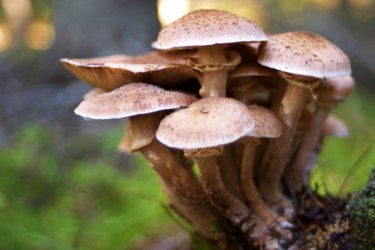
Mushrooms are a popular addition to many dishes, salads and sauces, or served sautéed alone as a side dish. Not all mushrooms are safe to eat, with various possible negative side effects. Some wild mushrooms — like giant puffballs — are only edible when picked at the right time.
Specialty mushrooms are available at your local grocers. These mushrooms are commercially grown and considered safe for human consumption, but some might produce serious side effects if you are allergic or they are contaminated.
Video of the Day
Video of the Day
Food Poisoning
Food poisoning is a negative side effect of mushrooms contaminated with campylobacter jejuni, a bacterium that can be present on commercially grown mushrooms. Improper cleaning or cooking methods, cross-contamination from other animal-derived foods or improper pasteurization might be the cause of bacterial contamination, according to Al Wagner with the Texas Agricultural and Mechanical College. If you happen to eat mushrooms that are contaminated with the campylobacter jejuni bacteria, it might cause nausea, diarrhea or abdominal cramping. This bacterial strain is sensitive to extreme cold and dryness.
Death
Store-bought mushrooms are generally safe for eating as long as you are not allergic, but wild mushrooms can be deadly. Many wild mushrooms resemble edible mushrooms, such as button mushrooms, or chanterelles, but are toxic and can be fatal if you eat them. Picking wild mushrooms for consumption is risky and not recommended, cautions the Bluebonnet Master Gardener Association in its February 2007 issue of "The Blooming News." Deadly mushrooms -- such as the amanitas, false morel and little brown mushrooms -- should not be eaten.
Psychosis
One type of mushroom -- psilocybin, or magic mushrooms -- can cause hallucinations, delusional or irrational behavior, distorted sight or sound perceptions, dissociation from people or surroundings and psychosis, notes the National Institute on Drug Abuse. Psilocybin causes altered perception 20 minutes after ingestion, and the effects can last up to six hours. Psilocybin is eaten or drunk in a tea. It also causes negative physical effects, such as muscle weakness, drowsiness, nausea, vomiting and ataxia. Possession of magic mushrooms is illegal in the U.S.
Allergic Reaction
Spores produced by some mushrooms might cause extreme allergic reactions in some people. Certain people might have mold allergies that are triggered by eating mushrooms. Mushroom spores, also called mold spores, are released into the air in damp environments and can cause allergic reactions. Mold allergies can cause respiratory infections, asthma or lung disease. For this reason, federal and state regulations on mold and indoor air quality are in place.
- National Institute on Drug Abuse; "NIDA InfoFacts -- Hallucinogens-LSD, Peyote, Psilocybin, and PCP; June 2009
- Texas Agricultural and Mechanical University; "Bacterial Food Poisoning"; Al Wagner, Jr.
- Texas Agricultural and Mechanical University; "Texas Plant Disease Diagnostic Lab"; April 25, 2011
- Missouri Department of Conservation; "Poisonous Mushrooms"; 1983
- University of Maryland Medical Center; "Mold Allergy"; 2007
- EPA: Mold Resources